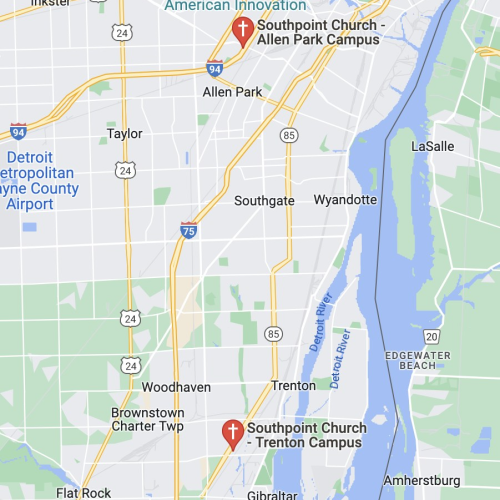“What’s the REAL story about Southpoint’s two locations separating?!” When we announced a couple of weeks ago on our church’s 31st birthday that we would be “un-multisiting” after 13 years of being a multi-site church, it was met with applause though there was the expected confusion & consternation that accompanied it, just like when we announced in 2009 that we were planning to start a 2nd location. We also knew that some would naturally wonder, “What’s REALLY going on behind the scenes?!” Who can blame anyone for being suspicious in times like these when we see so much covert garbage & cover-ups going on in our institutions, including churches? We’ve sadly come to expect it.
But I can assure you that there’s nothing more to this than a mutual decision that this will be the best route going forward considering that it is both inevitable & more biblical. It’s not about hostility, money, or ego. So what does all this mean? It means that as of September, Southpoint will once again consist only of its original location in Trenton. The Allen Park congregation will become a completely separate, independent church known as Hope City. Until then, we remain one church in two locations, sharing the same name, doctrine, elders, staff, mission, values, strategy, budget, & Sunday messages. Yes, we are separating, but we are not “splitting” in some kind of divisive way. This is a planned “un-coupling.” We will become friendly “sister” churches.
You may know that for a while Southpoint was one church in three locations. In 2015 we sent out many people to start a location in Huron Township, but in 2019 their desire was to go independent. So it seemed the best course was to “un-multisite” by allowing it to become independent in spite of being only 4 years old & not having its own Elders. We blessed it regardless based on their promise of continuing to remain a church that kept the same doctrine as us.
After many years now of seeing how multi-site churches operate, it’s become increasingly clear that it is an “unnatural” structure. There’s no model for any of this in Scripture in the way it’s being practiced as a new form of denominationalism. I’ve grown increasingly uncomfortable with it & have been saying for a while that multi-site can be a good strategy for starting a church, but not for continuing indefinitely once a church is stable & has its own Elders in place. Multisite as it typically functions carries numerous problems that Southpoint has happily avoided because we’re local & can rotate preachers & Elders—shepherds who actually know their flock at both locations.
We also have had in-person preaching instead of on-screen at other locations which could lead to a dependence on one man & a personality-driven church. To truly be considered “multisite,” it seems everyone really needs to hear the same message from the same messenger. But If a congregation has a different primary preacher, it’s inevitable that people will begin to see that preacher as their “lead minister.” Mark & I rotate only about once a month, so it was only natural for it to happen. Mark & I are great friends, & have shared amazing alignment for the 17 years he’s been here. Yet we are naturally different in some ways with some different ideas. I had hoped that one day in the future Mark would be my successor at Southpoint. But Mark should be a Lead Minister now, not later.
Multisite structure leads to a strong centralized leadership with a hierarchical structure. While the New Testament does leave some freedom for leadership structure, it knows nothing of hierarchies with a “diocese” (region) led by a “Bishop” over various “parishes” (campuses). We’ve avoided that, but if we were to continue this structure I believe it would only increase the tensions of confusion & complexity. It seems every multisite church has these kinds of struggles.
If we were to remain as one church despite the ability to have two strong churches, I would question, “Why? What’s the point? Couldn’t this lead to becoming unbiblical & unhealthy?” Our two locations were already beginning to feel like two churches in some ways, & weren’t really “cross-fellowshipping.” It’s the natural default not to feel a sense of unity with people you’re separated from geographically. Is it really then just two churches under one administration for pragmatic or financial reasons?
In recent years some noteworthy churches nationally have un-multisited, including Northridge locally. I’m also aware of a multisite church with a number of campuses spread throughout a state that was initially preparing to release those campuses to become independent. But then it changed course (so far as I know), & decided to keep all those campuses after all. Yet, I question whether it’s truly functioning as “one” church, as well as the motives involved.
Becoming multisite was positive for us in a number of ways as we sought to take the church to where the people are all over Downriver. But in some ways, it hasn’t fulfilled our hopes, such as the growth of the original Trenton location. Two times Trenton sent out many people to begin other locations with the expectation that Trenton would continue with the same momentum of growth. That did not happen. Trenton never did gain the same number of people it sent out. Then the pandemic of course caused serious loss in churches all over the nation. Both Trenton & Allen Park are growing again, but the culture & the church has changed. While there will be sadness with separation, it can ultimately be a good thing to plan for it positively instead of letting it possibly happen negatively down the road. Prayerfully this will help us further the Great Commission, & make our best days still to come!


